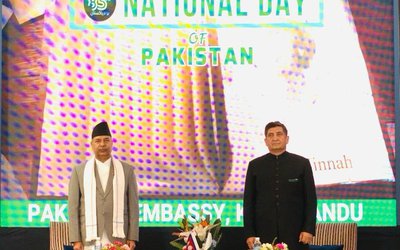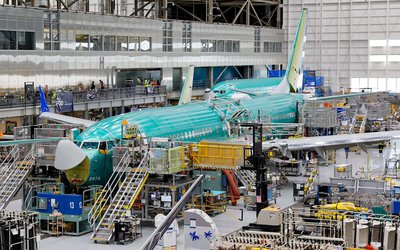
It is my distinct honour and privilege to address the Eighth Indian Ocean Conference being held in this historic and beautiful city of Muscat. I would like to convey warm greetings from the people of Nepal. I would like to thank the Government of the Sultanate of Oman, the India Foundation and S. Rajaratnam School of International Studies, Singapore for organizing this conference.
The main theme of this conference ‘Voyage to New Horizons of Maritime Partnership’ holds special significance for Nepal as a landlocked country. All of us present in this room are convinced that maritime partnership increases connectivity which is a key conduit for inclusive and sustainable growth of humanity.
The Global South represents a large percentage of humanity without whose progress, the gains made by the developed world are also jeopardized. As we deliberate on ‘Amplifying the Voice of the Global South,’ let us recognize that the Global South is key to building a more just, fair, and inclusive world.
Stronger South-South cooperation and collaboration is required to strengthen our collective resolve and resilience to overcome the challengesbrought about by inequality, poverty, the growing debt crisis, social unrest and conflict, the digital divide and climate change. These pressing challenges of our timesdisproportionately impact the Global South, -with higher stakes for least developed, landlocked and small island countries -where limitedresources and capacities exacerbatevulnerabilities.
South- South cooperation is regarded as an important development cooperation modality that address these challenges which transcend borders and impact inter-connected geographical areas. South- South cooperation could thus enable countries to leverage existing assets for mutually beneficial efforts as well as share home-grown solutions for collective gains and strengthen solidarity around emerging trends that could influence the prospects and development pathways of the region as a whole.
South-South and Triangular cooperation have been recognized as effective strategies to address immediate, short and long-term gains to get back on track the Sustainable Development Goals as envisioned by the agreements made at the Summit of the Future during the 79thSession of the UNGA in September, 2024.
Thus, I believe, this discussion being held today is on track to meeting the goals set out by the Summit of the Future. Further, the strategy of South-South cooperationhas also been recognized as key in accelerating efforts to meet all existing international commitments and work towards concrete steps to respond to emerging challenges and opportunities which was the aim of the Summit of the Future.
Though the existing forums created by the member countries of the LDCs, LLDCs and SIDs possess critical strengths, such as abundant natural resources, youth, strategic locations, untapped markets and innovations in sustainable technologies, there still exists dearth of synergy and strategy to tap the potentials of these precious resources. I am hopeful that this dearth of synergy and strategy will be overcome in the coming days by the Pact of the Future which was adopted by World Leaders at the UNGA 79th Session.
The Pact for the Future is regarded as a bold step forward for international cooperation that aims to create a world that is more equitable, sustainable, and prepared for the challenges of the coming decades. As we all know, these important documents also included a Global Digital Compact (GDC) and a Declaration on Future Generations (DFG). These documents are now regarded as the key guidelines for the future of the humanity. Thus, this discussion today, comes at an opportune moment as these pacts have been agreed to globally and are required to be taken forward.
I am especially hopeful as the UN Office for South-South Cooperation reports that the pact would “lay the foundations for a sustainable, just, and peaceful global order – for all peoples and nations”. More importantly, the Pact of the Future highlights the importance of South-South and Triangular cooperation in areas such as digital inclusion, AI Governance and building capacities in science, technology and innovations.
I feel the roadmap for the future is pretty clear. We have had almost global consensus on the way forward for the future of humanity and identified synergies and strategies required therein. I would like to reiterate that the Global-South represents the majority of humanity and if we are going to leave no one behind and we do not want to be left behind, we must pull-up our socks, girdle our loins and be serious about organizing around our identified agendas by devoting time and resources to bring together more frequently to the sit around the table the concerned stakeholders in order to achieve our common goals.
In this very spirit, Nepal is hosting ‘Sagarmatha Sambaad’, a permanent global dialogue forum to discuss pressing issues of regional and global importance. The first edition, to be held in Kathmandu from 16 to 18 May 2025, will revolve around the theme of ‘Climate Change, Mountains, and the Future of Humanity.’ We hope to bring together the affected communities, scientists, mountaineers, world leaders to deliberate andto commit to mitigating the impacts of climate change on mountains and glaciers. I would like to invite you all to participate in this dialogue.
To unleash the full potential of the Global South, we must prioritize:
- Reviewing of required policies for improving South-South Cooperation
- Strengthening regional integration and fostering mutual learning;
- Ensuring fair and equitable access to financial resources;
- Reforming global governance and financial institutions to ensure the voice and representation of Global South;
- Advocacy for the fulfillment of commitments by the developed countries;
- Promoting equitable sharing and management of natural resources;
- Improving connectivity by expanding regional networking through road, air and sea;
- Advancing capacity building through the transfer of knowledge, skills, and technology;
In conclusion, I would like to stress upon the importance of listening to women and youth in amplifying the voices of the South. This is our time to rise and act: let's build a legacy of progress that will inspire generations ahead.
In an interconnected world, our progress hinges on our shared vision and united action. Nepal remains steadfast in its commitment to expanding the ‘New Horizons’ for the Global South for sustainable and inclusive development.
Together, let us build a future of peace, progress, and prosperity for the Indian Ocean region and beyond.
Dr. Arzu Rana Deuba is the Foreign Minister of Nepal, Excerpts of her statement delivered at the Eighth Indian Ocean Conference on Voyage to New Horizons of Maritime Partnership held in Muscat, Oman 16-17 ebruary 2025. The theme “Amplifying the Voice of the Global South”














